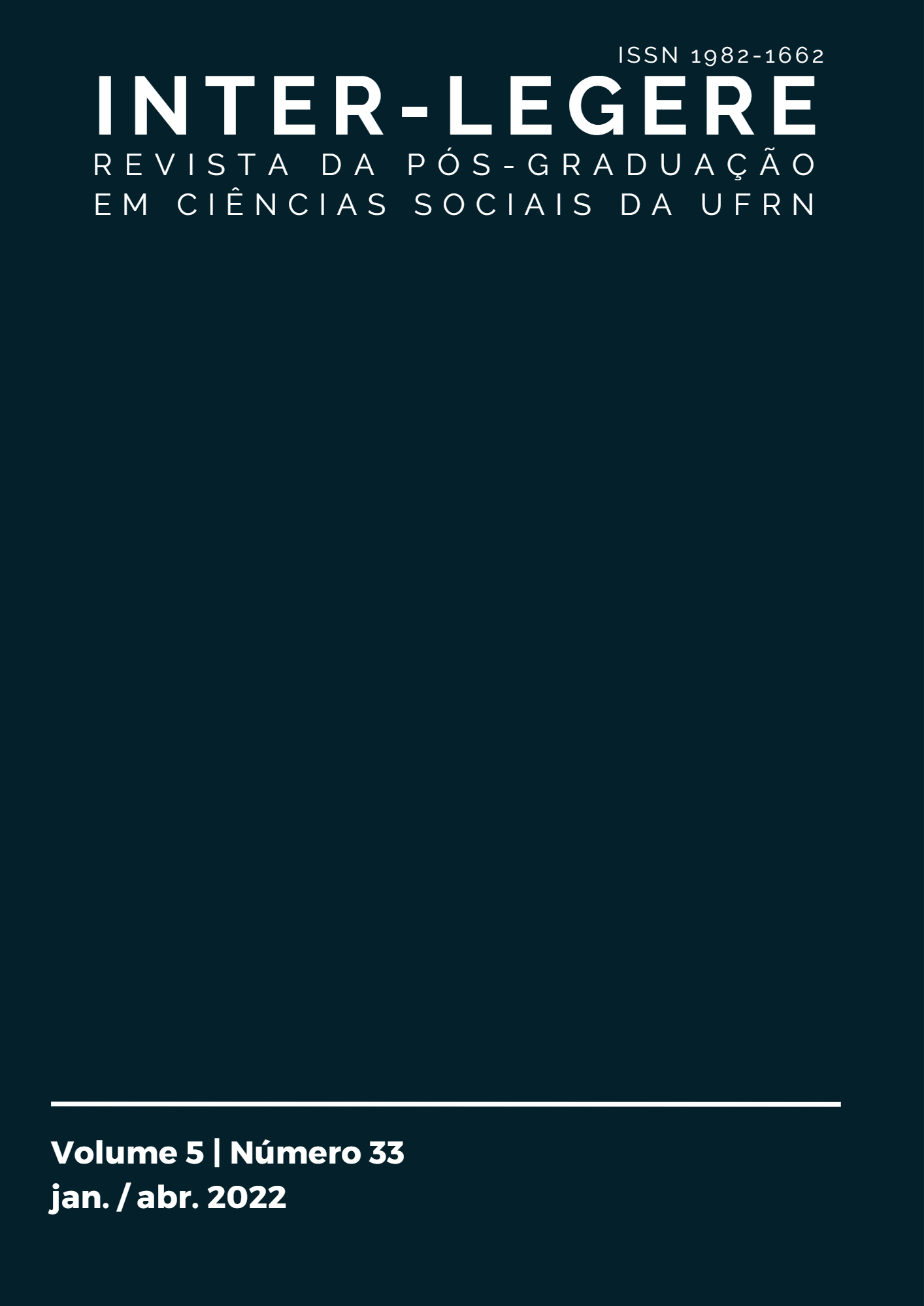A trajetória da política de assistência social no Brasil
a influência das instituições, dos atores e dos arranjos institucionais
DOI :
https://doi.org/10.21680/1982-1662.2022v5n33ID28541Résumé
O presente artigo versa sobre a trajetória de formação e implementação da política de assistência social no Brasil, desde a sua instituição no Sistema de Seguridade Social, pela Constituição Federal de 1988, até a aprovação da lei do SUAS em 2011. Nosso objetivo é apresentar uma discussão sobre a política a partir da perspectiva do neoinstitucionalismo na análise de políticas públicas. Buscamos relacionar também o emprego de arranjos institucionais e seus desdobramentos na efetivação dos objetivos propostos pelos formuladores da política. Para tanto, empregamos a metodologia de análise qualitativa com uso das técnicas de pesquisa bibliográfica e consulta documental. Os resultados mostram que a influência das instituições e dos atores na formação e implementação resultaram numa política pública sustentada por um sistema teoricamente bem elaborado, com princípios e diretrizes centrados na perspectiva do direito e da equidade social. Porém os mecanismos que propiciam a sua operacionalização rebatem nas concepções políticas e econômicas, desfavoráveis ao alcance dos objetivos da política.
Palavras-chave: Assistência Social. Instituições. Política Pública. Neoinstitucionalismo.
Referências
BAPTISTA, T. W. F.; REZENDE, M. A ideia de ciclo na análise de políticas públicas. In MATTOS, R. A.; BAPTISTA, T. W. F. Caminhos para análise das políticas de saúde, 2011. p.138-172. Online: disponível em www.ims.uerj.br/ccaps. Acesso em: 16 de maio de 2022.
BICHIR, Renata; SIMONI JUNIOR, Sergio; PEREIRA, Guilherme. Sistemas nacionais de políticas públicas e seus efeitos na implementação o caso do Sistema Único de Assistência Social (SUAS). Revista Brasileira de Ciências Sociais, v. 35, 2020.
BICHIR, Renata; SIMONI JR, S. Disseminação de capacidades estatais na política de assistência social: uma análise na escala dos municípios In: Capacidades estatais municipais: o universo desconhecido no federalismo brasileiro. 1 ed. Porto Alegre: Editora da UFRGS/CEGOV, 2021, v.1, p. 434-470.
BRASIL.POLÍTICA NACIONAL DE ASSISTÊNCIA SOCIAL (PNAS). Ministério do Desenvolvimento Social e Combate à Fome, Secretaria Nacional de Assistência Social, Brasília, 2004a.
BRASIL. Lei nº 10.836 de 9 de janeiro de 2004. Cria o Programa Bolsa Família. Brasília (DF), 2004b. Disponível em: http://www.planalto.gov.br. Acesso em: 17 jul. 2021.
BRASIL. Lei nº 14.284 de 29 de dezembro de 2021. Institui o Programa Auxílio Brasil e o Programa Alimenta Brasil. Brasília (DF), 2021. Disponível em: http://www.planalto.gov.br. Acesso em: 10 de mar. 2022.
BRASIL. NORMA OPERACIONAL BÁSICA DE RECURSOS HUMANOS (NOBRH/SUAS/2006). Ministério do Desenvolvimento Social e Combate à Fome, Secretaria Nacional de Assistência Social, 2006.
BRASIL. NORMA OPERACIONAL BÁSICA (NOB/SUAS/2012). Ministério do Desenvolvimento Social e Combate à Fome, Secretaria Nacional de Assistência Social, 2012.
BRASIL. Decreto Lei 6.135 de 26 de junho de 2007. Dispõe sobre o Cadastro Único para Programas Sociais do Governo Federal e dá outras providências. Brasília, 2007a. Disponível em: http://planalto.gov.br. Acesso em: 16 de jul. de 2021.
BRASIL. Decreto de 26 de setembro de 2007. Regulamenta o benefício de prestação continuada da assistência social devido à pessoa com deficiência e ao idoso de que trata a Lei n o 8.742, de 7 de dezembro de 1993, e a Lei nº 10.741, de 1º de outubro de 2003, acresce parágrafo ao art. 162 do Decreto n 3.048, de 6 de maio de 1999, e dá outras providências. Brasília, 2007b. Disponível em: http://planalto.gov.br. Acesso em: 17 de jul. de 2021.
BRASIL. Boletim de Políticas Sociais Acompanhamento e Análise n. 13 edição especial 2007. INSTITUTO DE PESQUISA ECONÔMICA APLICADAS POLÍTICAS SOCIAIS ACOMPANHAMENTO E ANÁLISE (IPEA). Diretoria de Estudos Sociais. Brasília, 2007c.
BRASIL. Ministério da Cidadania. Programa Bolsa Família. Brasília (DF), 2021. Disponível em: https://www.gov.br/cidadania/pt-br. Acesso em: 17 de jul. de 2021.
BRASIL. Constituição Federal. 1988. Constituição da República Federativa do Brasil de 1988. Disponível em: http://planalto.gov.br. Acesso em: 21 de jun. de 2021.
BRASIL. Resolução 13/2014. Tipificação Nacional dos Serviços Socioassistenciais. Conselho Nacional de Assistência Social – CNAS. Brasília, 2014.
BRASIL. Resolução CIT Nº 7, de 10 de setembro de 2009. Protocolo de Gestão Integrada de Serviços, Benefícios e Transferências de Renda no âmbito do Sistema Único de Assistência Social (SUAS). Comissão Intergestores Tripartite. Brasília, 2009.
BRASIL. Emenda constitucional 93/2016. Altera o Ato das Disposições Constitucionais Transitórias para prorrogar a desvinculação de receitas da União e estabelecer a desvinculação de receitas dos Estados, Distrito Federal e Municípios. Disponível em: http://planalto.gov.br. Acesso em: 17 de jul. de 2021.
BRASIL. Emenda constitucional 95/2016. Altera o Ato das Disposições Constitucionais Transitórias, para instituir o Novo Regime Fiscal, e dá outras providências. Disponível em: http://planalto.gov.br. Acesso em: 17 de jul. de 2021.
BRASIL. Programa Nacional de Capacitação do Sistema Único de Assistência Social (CapacitaSUAS). Ministério da Cidadania. Secretaria Nacional de Assistência Social (CNAS), Brasília, 2015. Disponível em: http://mds.gov.br/assuntos/assistencia-social/gestao-do-suas/gestao-do-trabalho-1/capacitasuas Acesso em: 15 de jul. de 2021.
BRASIL. Ministério da Cidadania. Secretaria Especial do Desenvolvimento Social, 2020a. Disponível em: https://www.gov.br/cidadania/pt-br. Acesso em: 17 de jul. de 2021.
BRASIL. Ministério da Cidadania. Portaria 351 de 7 de abril de 2020. Brasília, 2020b. Disponível em: https://www.gov.br/cidadania/pt-br. Acesso em: 19 de jul. de 2021.
BRESSER PEREIRA, Luiz Carlos. A reforma do Estado dos anos 90: lógica e mecanismos de controle. Lua Nova: Revista de cultura e política, p. 49-95, 1998.
CARVALHO, José Murilo de. Cidadania no Brasil: o longo caminho. Rio de Janeiro: Civilização Brasileira, 2021.
CAVALCANTE, Almira Almeida. Proteção Social e Pandemia da Covid-19: o lugar da transferência de renda. Revista Temporális, Brasília, ano 21, n. 41, p. 205-218, jan-jun. 2021.
CAVALCANTE, Pedro; RIBEIRO, Beatriz Bernanrdes. O Sistema Único de Assistência Social: resultados da implementação da política nos municípios brasileiros. Revista de Administração Pública, Rio de Janeiro, v. p. 1459 - 1477, nov-dez. 2012.
COUTO, Berenice Rojas. O direito social e a assistência social na sociedade brasileira: uma equação possível? 4. Ed. São Paulo: Cortez, 2010.
DA SILVA SALGADO, Bruna Carina et al. Políticas Públicas e o Sistema Único de Assistência Social. Revista Inter-Legere, v. 4, n. 31, p. c26447-c26447, 2021.
GOMIDE, Alexandre; PIRES, Roberto. Capacidades estatais para o desenvolvimento no século XXI. Boletim de Análise Institucional, Brasília, n 2, p. 25-30, 2012. Disponível em: http://repositorio.ipea.gov.br/bitstream/11058/6760/2/BAPI_n02_p25-30_RD_Capacidades-estatais_Diest_2012-ago.pdf. Acesso em: 20 de jul. de 2021.
IBGE. Síntese de indicadores sociais: uma análise das condições de vida da população brasileira: 2020 / IBGE, Coordenação de População e Indicadores Sociais. - Rio de Janeiro: IBGE, 2020.
148 p.
IMMERGUT, Ellen M. As regras do jogo; a lógica das políticas de saúde na França, na Suíça e na Suécia. Revista Brasileira de Ciências Sociais 11(30):139-165, Rio de Janeiro, 1996.
KINGDON, John W. (1995). Agendas, Alternatives, and Public Policies. 2nd Edition. Harper Collins CollegePublishers. in SARAVIA, Enrique; FERRAREZI, Elisabete. (2007). Políticas Públicas – Coletânea. Volume 1.
LOTTA, Gabriela, FAVARETO, Arilson. Os Arranjos Institucionais dos Investimentos em Infraestrutura no Brasil: uma análise sobre seis grandes projetos do programa de aceleração de crescimento. Texto para Discussão 2253. Instituto de Pesquisa Econômica Aplicada, Brasília, 2016.
LOUREIRO, Maria Rita.; MACÁRIO, Vinícius; GUERRA, Pedro Henrique. Legitimidade e efetividade em arranjos institucionais de políticas públicas: o Programa Minha Casa Minha Vida. Revista de Administração Pública, Rio de Janeiro, v. 49, n. 6, p. 1531 a 1554, 8 out. 2015.
MARQUES, Eduardo César Notas Críticas à Literatura sobre Estado, Políticas Estatais e Atores Políticos. Revista Brasileira de Informações Bibliográficas. Rio de Janeiro, N. 43. 1º semestre de 1997, p.p. 67-102.
MENICUCCI, Telma Maria Gonçalves. Implementação da Reforma Sanitária: a formação de uma política. Revista Saúde e Sociedade. São Paulo, v. 15, n. 02, p. 72-87, maio-ago. 2006.
MINAYO, Maria Cecília de Souza. O desafio do conhecimento – Pesquisa Qualitativa em Saúde. São Paulo, 2004. Disponível em: https://pdfcoffee.com/qdownload/o-desafio-do-conhecimento-minayo-pdf-free.html. Acesso em: 13 de maio\ de 2022.
MOEHLECKE, S. Neoinstitucionalismo e políticas educativas. Revista Educação em Questão, v. 56, n. 50, 11 dez. 2018.
OLIVEIRA, Vanessa (2013). “As fases do processo de políticas públicas”. In: Vitor Marchetti (org). Políticas Públicas em debate, São Bernardo do Campo, MP Editora.
PIRES, Roberto, Rocha C., GOMIDE, Alexandre de Avila. Burocracia, Democracia e Políticas Públicas: Arranjos Institucionais de Políticas de Desenvolvimento, 2014. INSTITUTO DE PESQUISA ECONÔMICA APLICADAS POLÍTICAS SOCIAIS (IPEA). Diretoria de Estudos Sociais. Texto para discussão.
ROCHA, Carlos Vasconcleos. Neoinstitucionalismo como modelo de análise para as políticas públicas: algumas observações. Civitas - Revista de Ciências Sociais, v. 5, n. 1, p. 11-28, 28 dez. 2006.
ROCHA NETO, João Mendes; BORGES, Djalma Freire. A política regional brasileira frente a teoria da extinção de políticas públicas. Redes (St. Cruz Sul, Online), Santa Cruz do Sul, v. 25, p. 1715-1737, nov. 2020. Disponível em: https://online.unisc.br/seer/index.php/redes/article/view/13270. Acesso em: 25 de jul. 2021.
SECCHI, Leonardo, SOUZA, Yalle Hugo de. Extinção de Políticas Públicas. Síntese teórica sobre a fase esquecida de do policy cicle. Cadernos Gestão Pública e Cidadania, São Paulo, v. 20, n. 66, jan-jun, 2015.
SOUZA, Celina. Políticas Públicas: uma revisão de literatura. Dossiê e Políticas Públicas. Sociologias, Porto Alegre, ano 8, n. 16, jun-dez, 2006.
SOUZA, Celina. Federalismo e capacidades estatais: o papel do estado-membro na política de assistência social. In: PIRES, Roberto; LOTTA, Gabriela; OLIVEIRA, Vanessa Elias (Org.). Burocracia e políticas públicas no Brasil: interseções analíticas. Brasília: Ipea: Enap, 2018. 413 p.
SOUZA, Celina, GRIN, Eduardo José. Desafios da Federação Brasileira: Descentralização e Gestão Municipal. In: Capacidades estatais municipais: o universo desconhecido no federalismo brasileiro. 1 ed. Porto Alegre: Editora da UFRGS/CEGOV, 2021, v.1, p. 87-123.
SPOSATI, A. Concepção e gestão da proteção social não contributiva no Brasil. Brasília: Ministério do Desenvolvimento Social e Combate à Fome, UNESCO, 2009.
Téléchargements
Téléchargements
Publié-e
Comment citer
Numéro
Rubrique
Licence
© Almira Almeida Cavalcante 2022

Cette œuvre est sous licence Creative Commons Attribution - Pas d'Utilisation Commerciale - Partage dans les Mêmes Conditions 4.0 International.


 Português (Brasil)
Português (Brasil) English
English Français (Canada)
Français (Canada) Español (España)
Español (España)





